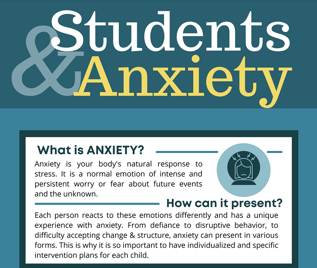Somehow, we’ve reached the final chapter of 2021. It's safe to say that this year was one giant learning experience as we all have tried to adapt to a world that was unrecognizable just two years ago. 
We've been lucky to have so many brilliant individuals share their wisdom with our community and contribute to this year of learning. Between the dozens of teachers, therapists, professors, coaches, and students who've contributed to our blog during this year, as well as the many panelists who joined our webinars, there has been an incalculable amount of insights shared in 2021. Lucky for you, we’ve rounded up the 21 best tips from the year into one place for your benefit! Let’s dive right in.
Tip 1: Don’t motivate your child (seriously)
Motivation can be tricky to navigate due to the fact that we can’t truly motivate our kids in the way that we might want to. The approach of trying to motivate our students has two big issues.
- It keeps our kids dependent on us instead of helping them learn to do things for themselves.
- It misses the fact that kids are driven by their own motives, not ours.
Students who seem unmotivated may not see the relevance of their school work and other “boring” priorities. The key is tapping into their own personal motivators. Read lots more in this post: Why You Should Stop Motivating Your Kids (and what to do instead.)
Tip 2: Help your student build self-awareness
The development of self-awareness (also known as metacognition) typically happens over time as children mature, but that doesn’t mean you can’t facilitate the process. Help your child reflect on their current day-to-day routines as they’re doing them, as well as after they finish, so they can understand their own thinking process and problem solve more effective approaches. Instead of telling them what to do, you can allow them an opportunity to understand themselves and their needs and adjust their actions accordingly (with a little guidance from you, of course!)
Tip 3: Embrace imperfection as part of a growth mindset
In its simplest description, a growth mindset is a perception that our most basic abilities can be developed through dedication and hard work - natural talents are just the starting point! However, students with Executive Function challenges often make negative assumptions and comparisons about themselves such as “I’m not as smart” or “_____ is just more gifted than I am.” These feelings come from mistakes or failures, so it’s critical to emphasize to our kids that the path towards success of any kind is filled with self-doubt and imperfection. Encouraging your student to embrace those mistakes as an essential part of the journey will help them move toward accepting imperfection along the way.
Tip 4: Celebrate small wins
It’s easy to notice when we fall short of a goal - but if you look hard enough, you’re likely to find small successes, too. Maybe your student didn’t do as well as they wanted to on that exam in Algebra. But where did they go right? Maybe they stayed and worked with the teacher for an extra help session. Maybe they did a bunch of practice problems for active studying. Maybe they didn’t miss any homework assignments leading up to the test. Sometimes, even if they just care that they didn’t do well can be seen as a sign of engagement that may have been missing before - and that can form the basis of an action plan to help them do better on the next assessment. Each one of those actions is worth celebrating in its own right as they’re all concerted efforts towards growing from past mistakes and changing one’s approach. As we know, this kind of change is really hard and sometimes all we need is a little positive reinforcement to keep going. And best of all? Over time, these small wins stack up and transform into big ones.
Tip 5: Make good habits easy and bad habits hard
Starting a new healthy habit can seem impossibly difficult. To help break through the discomfort, Dr. Kaman Hung, an Executive Function Coach at Beyond BookSmart, recommends 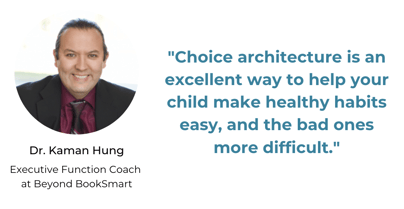 finding ways to make good habits easy and bad habits hard - a concept called “choice architecture.” For example, if your child has a hard time brushing their teeth, you can make it easier by getting them an electric toothbrush. If you want to encourage healthy snack choices, have fresh veggies all prepared for dipping and enjoying - and put sweets out of sight and out of reach.
finding ways to make good habits easy and bad habits hard - a concept called “choice architecture.” For example, if your child has a hard time brushing their teeth, you can make it easier by getting them an electric toothbrush. If you want to encourage healthy snack choices, have fresh veggies all prepared for dipping and enjoying - and put sweets out of sight and out of reach.
Tip 6: Help your student feel autonomous
Kids and teens naturally want to feel like they’re independent and making their own choices. Parents can tap into this strategically by allowing their children as many opportunities to make their own decisions as possible. For example, if there are a number of tasks that need to be done around the house, give them the opportunity to choose what they want to do rather than assign it. This simple act allows them to have a say in what happens, even if it’s not their favorite activity in the world.
Tip 7: Reduce friction at home by leading a shift in language
To foster a calmer, more collaborative relationship with your child, try these 3 simple shifts.
- Shift your language from directions to explorations to encourage self-reflection and empowerment
- Investigate and collaborate with your child instead of directing them to use a strategy
- Change how you measure success and avoid an all-or-nothing perspective. Don’t miss the small wins!
The standard for what your student's success looks like needs to meet them where they are, rather than where they "should be."
Tip 8: Write better essays by creating a ritual around the writing process
A bit like how Pavlov conditioned dogs to salivate at the sound of a bell in anticipation of food, creating conditions that will relax your student in preparation for writing will help them get started faster and avoid falling into the trap of writing perfectionism. A ritual might include creating a specially dedicated study space with an ergonomic chair, playing soft instrumental music, or brewing water for a cup of tea or hot cocoa. This preparation for writing may be best described to your student as “getting in the zone.”
Tip 9: Develop healthy coping strategies for stress that involve your passions/interests
As life becomes more hectic and our time more limited, it also becomes increasingly difficult to expend the mental energy towards the types of interests and passions that require it, such as practicing an instrument, reading a book, or playing a sport. Although it may feel good in the short-term to preserve that energy and watch Netflix instead, we’re likely not going to feel good about it or gain any benefits the next day. If we can get ourselves to regularly push through that initial barrier, we quickly find that the energy it takes to get started is returned ten-fold as we improve or get invested in something. When life gets difficult, these interests will be the support cushion waiting for us, ready to divert our minds away from whatever is making us overwhelmed.
Tip 10: When it comes to student anxiety: “Don’t try to run the race for them and don’t remove the hurdles, instead let them run and teach them to jump.”
Erin Fisher, a therapist at Individual & Family Connection Counseling in IL, offered this piece of advice in our webinar on anxiety earlier this year:
"Rather than avoid or immediately alleviate anxiety-provoking experiences, we want children to 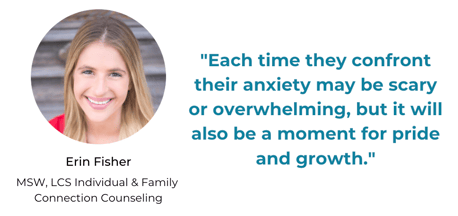 develop skills to work through them. Each time they confront their anxiety may be scary or overwhelming, but it will also be a moment for pride and growth. They become better equipped to navigate the next occurrence and advocate for themselves in anxiety-inducing situations."
develop skills to work through them. Each time they confront their anxiety may be scary or overwhelming, but it will also be a moment for pride and growth. They become better equipped to navigate the next occurrence and advocate for themselves in anxiety-inducing situations."
Tip 11: Address mental health issues before Executive Function challenges.
Navigating support for a student with complex issues can be a real challenge. Where do you begin? If one of those challenges is mental health related and another is around Executive Function, the answer is simple: start with mental health. The consequences of untreated mental health challenges can be far-reaching and potentially dangerous, not to mention that anxiety and depression have substantial impacts on our ability to focus, stay organized, and manage our time effectively. By treating a mental health challenge first with professional support, you’re getting at a root issue. When you’ve seen progress there, then it may be time to jump into Executive Function support. (We’re here when you’re ready!)
Tip 12: If your student is struggling with anxiety & academics, withhold assumptions and ask good questions
Anxiety can be an uncomfortable subject to confront, but Jennifer Flewelling, an Executive Function coach here at Beyond BookSmart, shared the importance of approaching the issue with empathy and an open mind - especially in the context of school. Withhold assumptions relating to why your child did not do something they should have or why they’re not meeting expectations. Instead, assume your child wants to succeed and wants to pass in work on time, but their anxiety may have interfered in some way. Maybe they didn't know how to get started, for example - and students can find relief from their anxiety in this instance when they have strategies to help them initiate work. This calm, understanding approach can work wonders. 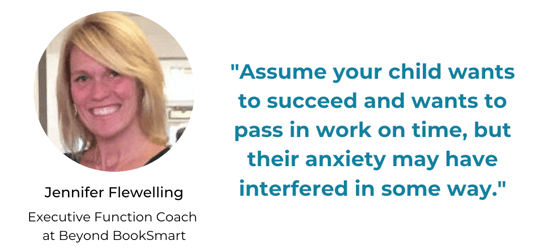
Tip 13: Prioritize what really deserves study time
Students often waste a ton of time studying stuff that either is not important or that they already know. For much more effective studying, have your student gather a study guide and spend some time color coding based on 1) what they know and feel comfortable with, 2) what they don’t know well, and 3) what they don’t know at all (using a separate color for each level). This exercise will make it clear which areas actually deserve study time vs. what they already are comfortable with. Better than trying to binge-read 10 textbook chapters, huh?
Tip 14: Encourage reading in your student by reading aloud or alongside
A great way to encourage students to read is to either read aloud with or read alongside them. To learn more about the value of families reading aloud, check out the Read Aloud Revival, a website that offers resources (the podcast is excellent), book recommendations, and insight from experts about why reading aloud is so beneficial. Not only does reading aloud promote reading comprehension and help students form connections between ideas, for students in both primary and secondary education and higher education, reading aloud has been found to boost feelings of belonging and being part of a community. And this makes sense: reading aloud moves reading from a solitary action to an interactional one.
Tip 15: Use simple mindfulness practices like 5-Finger Breathing to relieve stress
When we’re feeling worked up or stressed, we could use a simple strategy to calm down and recenter. One of our favorites for this is called 5-Finger Breathing and it’s super simple. Here’s how to do it:
- Stretch out your hand like a star
- Get the pointer finger of your other hand ready to trace your fingers up and down
- Slide up each finger slowly - slide down the other side, starting with your thumb.
- Breathe in through your nose - out through your mouth as you slide
- Put it together and breathe in as you slide up and breathe out as you slide down
- Keep going until you have finished tracing your hand, and do the other hand if needed.
Tip 16: Help your child make SMART goals
Goal setting is a great foundation for making change, but not when the goal is unclear or unspecific. The remedy to this is to use SMART goals - in other words, goals that are specific, measurable, attainable, relevant, and timely. This approach to goal setting provides a roadmap right from the beginning that shows how you'll work toward an objective by taking that fuzzy, big picture goal and turning it into something sharp that invites real action. Setting specific, achievable goals helps build momentum toward bigger objectives.
Tip 17: Have an accountability partner
Having someone to hold your student accountable to commitments or goals can be a rock-solid way to keep them on track. However, when it comes to supporting your student, we recommend looking for something other than parental oversight or else you may jeopardize the goal by coming off as “nagging" (their words, not ours!) Here’s where a sibling, friend, or coach can fit in by being a point of check-in with your child to see how things are going toward their goals. Our coaches, in particular, like to use weekly sessions to problem solve when it’s been tough to follow through on those carefully laid plans or to anticipate upcoming challenges.
Tip 18: Get your student to use digital calendars (especially for college)
Strong time-management skills have always been important, but in college, they become absolutely critical. Between the demands of multiple classes and the complicated web of exam dates, deadlines, and extracurriculars to remember, it’s no wonder why parents worry about their student’s ability to juggle it all. Martha (Moe) Summa, an Educational Consultant at College Consulting Collaborative, shared some practical tips during our July webinar that your student can start using on week one next semester: 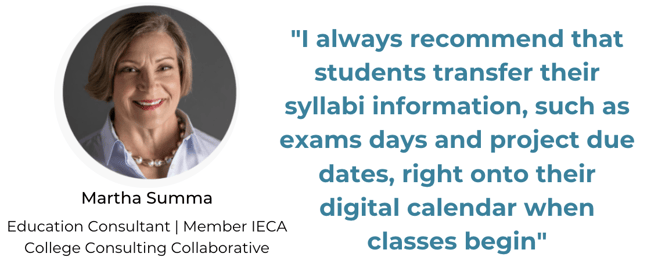
Students get a big picture view of the semester when they transfer their info to a single digital calendar. Moe also recommends including extracurriculars such as games or club commitments on the calendar, as well as when breaks in classes are scheduled, to help students get a sense of when the “hot weeks” are. This helps them anticipate challenging periods and plan accordingly.
Tip 19: Don’t rely on 504 Plans alone to save the day
Getting those 504 accommodations in place is really just the first step. Without a proper plan for how each accommodation will be used, it's unlikely that you'll see major changes in your student's learning experience. You see, 504 plans generally do not guarantee individualized support that helps students truly make the most of their accommodations. It’s kind of like having a recipe that lists the ingredients without the detailed instructions for how to prepare those ingredients. Take the time to consider which accommodations will be most beneficial, but also how your student will use them. You can read more about how to accomplish this here.
Tip 20: For a successful college transition, create a mental health safety net on campus
Recent studies have shown that college students are more burnt-out, anxious, and susceptible to depression than ever before - so it’s no wonder why so many parents are worried about their students' mental health in college. One of our guest panelists, Dr. Arjune Rama, shared his expertise during our July webinar on transitioning back to campus. As a psychiatrist who specializes in the mental health of young adults, Dr. Rama emphasized the importance of anticipating mental health challenges by coordinating with the mental health services around campus before arriving:
“Before your student even arrives on campus, look into the school’s mental services and the available practices around the area and have them make an appointment now to meet with someone when they arrive on campus." 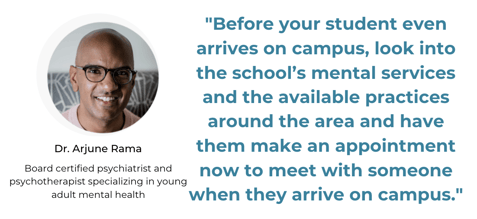
Tip 21: Tackle social anxiety by getting involved
Social anxiety has emerged as a big issue for many students over the past year, and it also proved to be a major concern for college students transitioning back to campus. The remedy?
“Encourage your student to get involved in on-campus activities and organizations,” says Dr. Rama. “Having strong social connections have so much to do with shared interests and experiences, so finding opportunities to get involved with interests that they currently have or ones they think they might want to try is the perfect jumping-off point to meet like-minded people."
Download our comprehensive infographic to learn tips to better support student anxiety.
Photo by Katerina Holmes from Pexels

